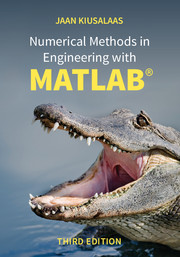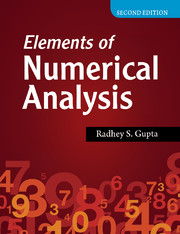Refine search
Actions for selected content:
1945 results in Engineering mathematics and programming
Chapter 13 - Least squares data fitting
- from Part III - Least squares
-
- Book:
- Introduction to Applied Linear Algebra
- Published online:
- 13 September 2019
- Print publication:
- 07 June 2018, pp 245-284
-
- Chapter
- Export citation
Chapter 11 - Matrix inverses
- from Part II - Matrices
-
- Book:
- Introduction to Applied Linear Algebra
- Published online:
- 13 September 2019
- Print publication:
- 07 June 2018, pp 199-222
-
- Chapter
- Export citation
Chapter 18 - Nonlinear least squares
- from Part III - Least squares
-
- Book:
- Introduction to Applied Linear Algebra
- Published online:
- 13 September 2019
- Print publication:
- 07 June 2018, pp 381-418
-
- Chapter
- Export citation
Chapter 17 - Constrained least squares applications
- from Part III - Least squares
-
- Book:
- Introduction to Applied Linear Algebra
- Published online:
- 13 September 2019
- Print publication:
- 07 June 2018, pp 357-380
-
- Chapter
- Export citation
Contents
-
- Book:
- Introduction to Applied Linear Algebra
- Published online:
- 13 September 2019
- Print publication:
- 07 June 2018, pp vii-x
-
- Chapter
- Export citation
Part II - Matrices
-
- Book:
- Introduction to Applied Linear Algebra
- Published online:
- 13 September 2019
- Print publication:
- 07 June 2018, pp 105-106
-
- Chapter
- Export citation
Chapter 6 - Matrices
- from Part II - Matrices
-
- Book:
- Introduction to Applied Linear Algebra
- Published online:
- 13 September 2019
- Print publication:
- 07 June 2018, pp 107-128
-
- Chapter
- Export citation
Part III - Least squares
-
- Book:
- Introduction to Applied Linear Algebra
- Published online:
- 13 September 2019
- Print publication:
- 07 June 2018, pp 223-224
-
- Chapter
- Export citation
Chapter 10 - Matrix multiplication
- from Part II - Matrices
-
- Book:
- Introduction to Applied Linear Algebra
- Published online:
- 13 September 2019
- Print publication:
- 07 June 2018, pp 177-198
-
- Chapter
- Export citation
Appendix C - Derivatives and optimization
- from Appendices
-
- Book:
- Introduction to Applied Linear Algebra
- Published online:
- 13 September 2019
- Print publication:
- 07 June 2018, pp 443-450
-
- Chapter
- Export citation
Chapter 7 - Matrix examples
- from Part II - Matrices
-
- Book:
- Introduction to Applied Linear Algebra
- Published online:
- 13 September 2019
- Print publication:
- 07 June 2018, pp 129-146
-
- Chapter
- Export citation
Chapter 1 - Vectors
- from Part I - Vectors
-
- Book:
- Introduction to Applied Linear Algebra
- Published online:
- 13 September 2019
- Print publication:
- 07 June 2018, pp 3-28
-
- Chapter
- Export citation
Chapter 19 - Constrained nonlinear least squares
- from Part III - Least squares
-
- Book:
- Introduction to Applied Linear Algebra
- Published online:
- 13 September 2019
- Print publication:
- 07 June 2018, pp 419-436
-
- Chapter
- Export citation
Chapter 5 - Linear independence
- from Part I - Vectors
-
- Book:
- Introduction to Applied Linear Algebra
- Published online:
- 13 September 2019
- Print publication:
- 07 June 2018, pp 89-104
-
- Chapter
- Export citation
Index
-
- Book:
- Introduction to Applied Linear Algebra
- Published online:
- 13 September 2019
- Print publication:
- 07 June 2018, pp 455-464
-
- Chapter
- Export citation

Numerical Methods in Engineering with MATLAB®
-
- Published online:
- 28 May 2018
- Print publication:
- 20 October 2015
-
- Textbook
- Export citation

Elements of Numerical Analysis
-
- Published online:
- 28 May 2018
- Print publication:
- 14 May 2015
-
- Textbook
- Export citation
3 - Linear Independence, Bases, and Coordinates
-
- Book:
- Linear Algebra
- Published online:
- 21 June 2018
- Print publication:
- 24 May 2018, pp 140-224
-
- Chapter
- Export citation
2 - Linear Maps and Matrices
-
- Book:
- Linear Algebra
- Published online:
- 21 June 2018
- Print publication:
- 24 May 2018, pp 63-139
-
- Chapter
- Export citation
Frontmatter
-
- Book:
- Linear Algebra
- Published online:
- 21 June 2018
- Print publication:
- 24 May 2018, pp i-iv
-
- Chapter
- Export citation
